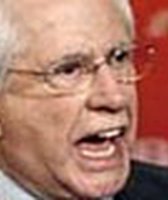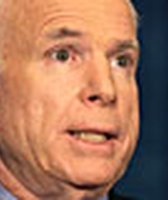Stand up for the facts!
Our only agenda is to publish the truth so you can be an informed participant in democracy.
We need your help.
I would like to contribute
SUMMARY: Attacks by conservatives became so sharp last week that Sen. John McCain asked for a cease-fire. Here's a look at why they're unhappy and what PolitiFact has said about their complaints.
Sen. John McCain spoke to the annual Conservative Political Action Conference in Washington on Feb. 7, 2008, where again he tried to ease the discomfort many conservatives have with his candidacy.
"We have had a few disagreements, and none of us will pretend that we won't continue to have a few," McCain said. "But even in disagreement, especially in disagreement, I will seek the counsel of my fellow conservatives. If I am convinced my judgment is in error, I will correct it. And if I stand by my position, even after benefit of your counsel, I hope you will not lose sight of the far more numerous occasions when we are in accord."
The attacks by right-wing commentators, who say he's a closet Democrat, have been so sharp that McCain urged a cease-fire the day before: "I do hope that at some point we would just calm down a little bit and see if there's areas we can agree on."
Here's what's at the root of it.
Sign up for PolitiFact texts
1. Tax Cuts. In 2001 and again in 2003, McCain joined Democrats in voting against President Bush's tax-cut proposal. The first time, he said the tax breaks didn't do enough for the middle class, and there was a need for increased defense spending. The second time, he said cutting taxes was inadvisable in a time of war. Both tax packages passed, and in 2006 McCain voted in favor of extending them. We've checked claims on McCain's lack of support for the Bush tax cuts here and here.
2. Immigration. In 2006, McCain co-wrote legislation to overhaul immigration laws and included a provision that would allow undocumented workers living in the United States to pay fees and fines and apply for citizenship. Critics dubbed it "amnesty," a reward for illegal border crossing though President Bush supported it, too. We've checked claims on this issue, and it's true when McCain says his plan is not amnesty.
3. Iraq. McCain is known as a staunch defender of the invasion of Iraq and the need to remain there over the long term. But he angered many in his party with his pointed criticism of the war's management, singling out former Defense Secretary Donald Rumsfeld. We checked claims on his support for Iraq here and here.
4. Campaign finance. McCain is perhaps best known for McCain-Feingold, the most significant change in campaign finance law in decades. The legislation banned national political parties from collecting unlimited amounts of cash, called "soft money," for generic party-building activities on the theory that the unchecked money was a conduit for special interest influence. The legislation also sharply curbed the political advertising that outside groups can do. Conservatives consider both pieces to have damaged the Republican Party and argue that it violated free speech.
5. Senate relationships. After more than 20 years in the Senate, McCain has stepped on some toes. In his long crusade against pork-barrel spending, he has made no effort to spare GOP colleagues from his public wrath, which has earned him a reputation for being sanctimonious. Still, we found a few blips on his record against what he calls "wasteful spending."










































